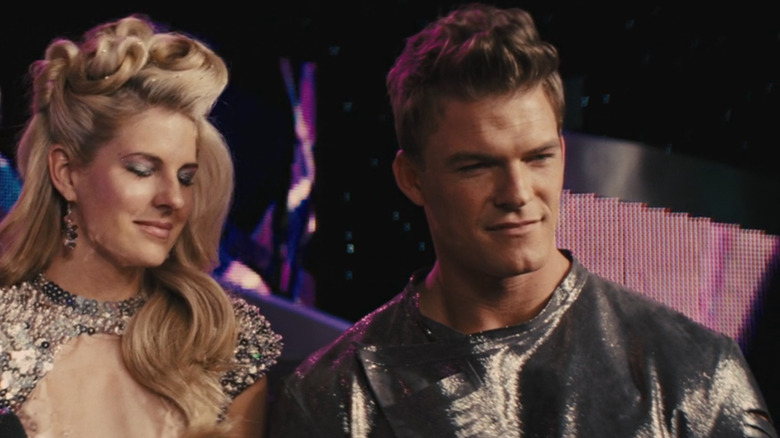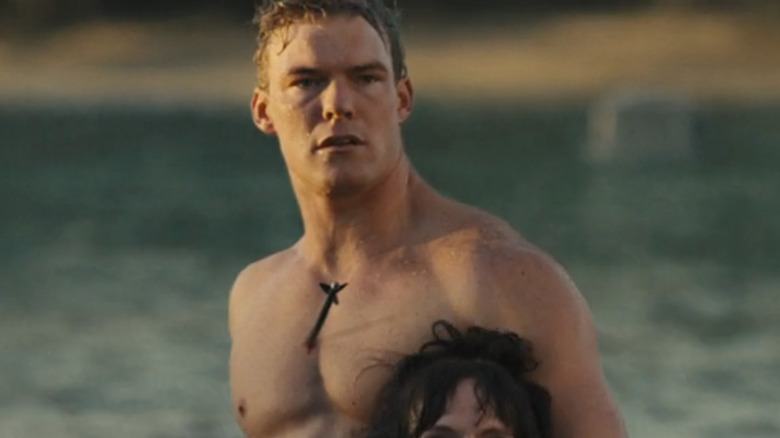Reacher's Alan Ritchson Thinks One Of His Hunger Games Scenes Makes No Sense
Before Alan Ritchson became a leading man of his own movies, he played a small role as one of the tributes in "The Hunger Games: Catching Fire." His character was Gloss, a returning adult champion who'd been a Career Tribute as a teenager. A Career Tribute is someone from the wealthier districts who doesn't see the games as a horrifying fate, but as a chance to gain a lifetime of riches and glory. Gloss was someone who'd trained from a young age to kill, and who likely would not have bothered to join the rebellion against the Capitol if he'd had the chance.
He never gets the chance, though, because Gloss dies in the middle of the games when Katniss shoots him with an arrow to the chest. It's a quick moment, and something most viewers likely forgot about shortly after it happened. However, it still haunts Ritchson due to a major change the movie made to the scene after filming. As Ritchson explained it in a March 2025 interview:
"Actually, I took an arrow to the face, so I played it like it was to the face. And then I think they decided in post that was a little too gruesome to take an arrow to the face by Katniss, so they changed it to my chest, but I didn't shoot it that way! I didn't shoot it like I was taking a shot to the chest. My head snapped back like an idiot and the thing went in my chest and I'm like this, 'who does that? I wouldn't have died like that.'"
To be fair, the scene doesn't look that bad. Sure, you can tell that Ritchson was acting out a shot to the head, but it still works as a reasonable shocked reaction.
Alan Ritchson's role in Catching Fire was very small
One possible reason why Gloss's death was changed so casually in the editing room, and why nobody bothered to give Ritchson the chance to do the scene over, is because Gloss isn't that important or memorable a character. While "Catching Fire" is a stronger film than the original "Hunger Games," there's one clear department where the original wins: the characterization of the Career Tributes.
The first movie's equivalent of Gloss was the headstrong Cato (Alexander Ludwig), a teenager from District 2 who seemed similarly bloodthirsty. Cato enjoyed delivering a reign of terror throughout that first game, making it all the way into the final three before Katniss and Peeta (well, mostly Katniss) took him down. The first movie may not have had the epic scale of the second, but it was still a fun time because the villainous tributes were given way more to do.
Before Cato died, "The Hunger Games" gave him a monologue where he realizes he too is a victim of the Capitol. He talks about how he's been brainwashed into thinking the Games would be a fun time, but now he knows that even if he wins he'll be haunted by what he's done forever. It's a powerful moment, and one that was never actually included in the source material. It helped to cement the idea that the other tributes were not Katniss's real enemy, an idea that would be explored more thoroughly in "Catching Fire."
Gloss, meanwhile, is essentially the Cliffnotes version of Cato. Same privileged background, same intimidating presence, but given a fraction of the screentime. It would've been nice if Alan Ritchson's presence in the "Hunger Games" franchise had been more substantial than this, but it could've been worse. At least his role wasn't as small and thankless as poor Jack Quaid's.

